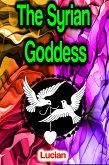A True Story Lucian - Lucian of Samosata (125c.180) was a Greek satirist of Syrian or Assyrian extraction, and True History is perhaps his most well-known tale. In this tale, the protagonist visits the Moon, meets extraterrestrial creatures, and takes part in interplanetary warfare. This piece of fantastical fiction parodies many works such as Homers Odyssey, and is certainly a contender for the title of earliest science fiction story.
Dieser Download kann aus rechtlichen Gründen nur mit Rechnungsadresse in B, BG, D, DK, EW, FIN, F, GR, IRL, I, HR, LR, LT, L, M, NL, PL, P, R, S, SK, SLO, E, CZ, H, CY, A ausgeliefert werden.








